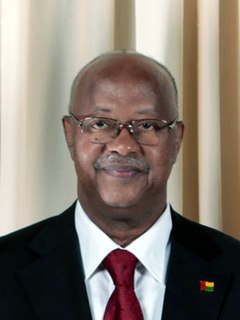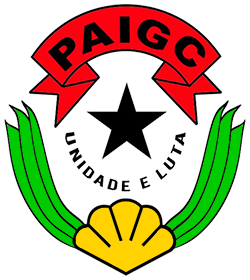Related Research Articles

Luís Severino de Almeida Cabral was a Bissau-Guinean politician who was the first President of Guinea-Bissau. He served from 1974 to 1980, when a military coup d'état led by João Bernardo Vieira deposed him. Luís Cabral was a half-brother of Amílcar Cabral, with whom he co-founded the African Party for the Independence of Guinea and Cape Verde (PAIGC) in 1956.

Kumba Ialá Embaló, also spelled Yalá, was a Bissau-Guinean politician who was president from 17 February 2000 until he was deposed in a bloodless military coup on 14 September 2003. He belonged to the Balanta ethnic group and was President of the Social Renewal Party (PRS). In 2008 he converted to Islam and took the name Mohamed Ialá Embaló. He was the founder of the Party for Social Renewal. In 2014, Ialá died from a cardiopulmonary arrest.

Carlos Domingos Gomes Júnior is a Bissau-Guinean politician who was Prime Minister of Guinea-Bissau from 10 May 2004 to 2 November 2005, and again from 25 December 2008 to 10 February 2012. He has been the President of the African Party for the Independence of Guinea and Cape Verde (PAIGC) since 2002 and is widely known as "Cadogo". He resigned as prime minister on 10 February 2012 to run in the presidential election triggered by President Malam Bacai Sanhá's death on 9 January.
Soares Sambú is a Bissau-Guinean engineer and politician who was deputy of the National People's Assembly and minister of the Presidency of the Council of Ministers, an agency that accumulates the functions of deputy head of government.

The African Party for the Independence of Guinea and Cape Verde is a political party in Guinea-Bissau. Originally formed to peacefully campaign for independence from Portugal, the party turned to armed conflict in the 1960s and was one of the belligerents in the Guinea-Bissau War of Independence. Towards the end of the war, the party established a socialist one-party state, which remained intact until multi-party democracy was introduced in the early 1990s. Although the party won the first multi-party elections in 1994, it was removed from power in the 1999–2000 elections. However, it returned to office after winning parliamentary elections in 2004 and presidential elections in 2005, since which it has remained the largest party in the National People's Assembly.

João Bernardo "Nino" Vieira was a Bissau-Guinean politician who was the President of Guinea-Bissau from 1980 to 1984, for the second time from 1984 to 1999, and for the third time from 2005 to 2009. After seizing power in 1980, Vieira ruled for 19 years, and he won a multiparty presidential election in 1994. He was ousted at the end of the 1998–1999 civil war and went into exile. He made a political comeback in 2005, winning that year's presidential election. Vieira was killed by soldiers on 2 March 2009, apparently in retaliation for a bomb blast that killed Guinea-Bissau's military chief General Batista Tagme Na Waie. The military officially denied these allegations after Army officials claimed responsibility for Vieira's death.

Elections in Guinea-Bissau take place within the framework of a multi-party democracy and a semi-presidential system. Both the President and the National People's Assembly are directly elected by voters.

This name uses Portuguese naming customs. the first or maternal family name is Bacai and the second or paternal family name is Sanhá.
The Party for Social Renewal is a political party in Guinea-Bissau. It is one of the country's leading parties and is currently the main opposition party.
This name uses Portuguese naming customs. the first or maternal family name is José and the second or paternal family name is Fadul.
Ansumane Mané was a Bissau-Guinean soldier who led a 1998 uprising against the government of President João Bernardo Vieira, which caused a brief, but bloody civil war.
Manuel Saturnino da Costa is a Bissau-Guinean politician who served as Prime Minister of Guinea-Bissau from 26 October 1994 to 6 June 1997.
Carlos Correia is a Bissau-Guinean politician who was Prime Minister of Guinea-Bissau from 17 September 2015 to 12 May 2016. Previously he was Prime Minister from 27 December 1991 to 26 October 1994, from 6 June 1997 to 3 December 1998, and from 5 August 2008 to 25 December 2008.

Aristides Gomes is a Bissau-Guinean politician who was the Prime Minister of Guinea-Bissau from 8 November 2019 until 28 February 2020. He previously served as Prime Minister from April 2018 to October 2019, and again from 2 November 2005 to 13 April 2007. He has subsequently served as President of the Republican Party for Independence and Development (PRID).
This name uses Portuguese naming customs. the first or maternal family name is Ndafa and the second or paternal family name is Kabi.

Parliamentary elections were held in Guinea-Bissau on 16 November 2008. The result was a victory for the African Party for the Independence of Guinea and Cape Verde (PAIGC), which won 67 out of the 100 seats in the National People's Assembly, while the Party for Social Renewal (PRS) won 28 seats.
Cipriano Cassamá is a politician in Guinea-Bissau and a member of the African Party for the Independence of Guinea and Cape Verde (PAIGC). He was Minister of the Interior from August 2008 to January 2009. He has been President of the National People’s Assembly since June 2014.

Raimundo Pereira is a Bissau-Guinean lawyer and politician who was interim President of Guinea-Bissau from 3 March 2009 to 8 September 2009 and again in 2012, following the departure of President Malam Bacai Sanhá for medical treatment abroad; he continued in that capacity after Sanha's death. Pereira was elected as President of the National People's Assembly on 22 December 2008. Pereira is a member of the African Party for the Independence of Guinea and Cape Verde (PAIGC). He was ousted in a coup on 12 April 2012 and succeeded by Mamadu Ture Kuruma.

José Mário Vaz is a Bissau-Guinean politician who served as President of Guinea-Bissau, from 23 June 2014 to 27 February 2020.

The 1980 Guinea-Bissau coup d'état was the bloodless military coup that took place in Guinea-Bissau on 14 November 1980, led by Prime Minister General João Bernardo Vieira. It led to the deposition of President Luís Cabral, who held the office since 1973, while the country's War of Independence was still ongoing. Furthermore, it resulted in the abandonment of the proposed unification of Guinea-Bissau with Cape Verde, a fellow Lusophone West African country. The Cape Verdean branch of the PAIGC party broke away and formed the new PAICV party in January 1981 under the leadership of Aristides Pereira, President of Cape Verde and former Secretary-General of the PAIGC.
References
- 1 2 3 4 5 "Guinea-Bissau: PAIGC chooses new chairman, expels Vieira", IRIN, 10 September 1999.
- ↑ "Guinea-Bissau: Formation of new government delayed again", IRIN, 11 January 1999.
- 1 2 "Guinea-Bissau party elects chairman, expels ex-president", AFP, 9 September 1999.
- ↑ "Guinea-Bissau: US, Cape Verde concerned over reported coup attempt", IRIN, 5 December 2001.
- ↑ "Guinea-Bissau: Opposition want evidence of attempted coup", IRIN, 6 December 2001.
- ↑ Biography of Gomes on PAIGC website Archived 3 September 2007 at the Wayback Machine (in Portuguese).
- ↑ "PAIGC elege presidente do Parlamento guineense" Archived 6 September 2004 at the Wayback Machine , Panapress, 20 April 2004 (in Portuguese).
- ↑ "Guiné-Bissau: Presidente do parlamento aconselha PR a não dissolver assembleia nem a demitir Governo", Lusa, 4 August 2008 (in Portuguese).
- ↑ Litos Sanca, "RESULTADOS DEFINITIVOS E LISTA NOMINAL DOS DEPUTADOS DAS ELEIÇÕES LEGISLATIVAS DE 2008", Agência Bissau, 27 November 2008 (in Portuguese).
- 1 2 "Guiné-Bissau: Jurista Raimundo Pereira é proposta do PAIGC para futuro presidente do parlamento do país" Archived 6 October 2016 at the Wayback Machine , Lusa, 8 December 2008 (in Portuguese).
- 1 2 Jeremias Pascoal Chago, "PAIGC ELEGE JURISTA RAIMUNDO PEREIRA PARA PRESIDENCIA DA ASSEMBLEIA NACIONAL POPULAR" [ permanent dead link ], Agência Bissau, 10 December 2008 (in Portuguese).
- ↑ Umaro Balde and Braima "Ibu" Fati, "NOVOS DEPUTADOS GUINEENSE TOMAM POSSE PARA UM MANDATO DE QUATRO ANOS" Archived 25 December 2008 at the Wayback Machine , Agencia Bissau, 22 December 2008 (in French).